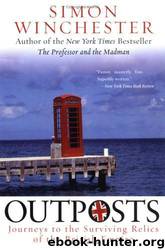Outposts: journeys to the surviving relics of the British Empire by Simon Winchester

Author:Simon Winchester
Language: eng
Format: mobi, epub
Tags: Europe, Special Interest, Travel, Essays & Travelogues, General, Great Britain, History
ISBN: 9780060598617
Publisher: HarperCollins
Published: 2004-06-03T07:29:58.940000+00:00
The British had few early doubts about the purpose behind the annexation of Hong Kong. The island had been placed there for the exclusive convenience of the British Empire, and its acquisition could only lead to one thing. ‘It is a notch cut in China,’ it was said at the time of the original Nanking Treaty, ‘as a woodman notches a tree, to mark it for felling at a convenient opportunity.’ Victoria, Empress of India, might soon add ‘Empress of China and Queen of Corea’ to her vast string of titles—and Hong Kong would surely be the vehicle by which she might do so.
But it was not to be. China was to be penetrated, but never vanquished. The British pierced the Manchu Empire one other time in 1898, when they forced a leasehold deal for the port of Weihaiwei, which lay across the Gulf of Chihli from the Russian enclave of Port Arthur. The British renamed their possession Port Edward, for the sake of symmetry. The Royal Navy loved the place and its people who were, as a journal reported at the time, ‘a comfortable set, easy to deal with’. But Weihaiwei was not to remain in the British Empire for long: the American Government, which disliked the idea of foreigners muddying the western Pacific waters, urged the British to give up the lease. They did, and abandoned the colony in 1930—the first part of the Empire to be given up voluntarily. (It was almost immediately overrun by the Japanese, and China did not get her little port back until 1945.)
The importance of Hong Kong was at first more symbolic than real. It gave the Royal Navy theoretical charge of the China Sea and, with the battleships and destroyers based at Esquimault on Vancouver Island, the northern Pacific Ocean. It was, as Lord Curzon wrote, ‘the furthermost link in the chain of fortresses which…girdles half the globe’. Or it was, as that most Imperially minded of admirals, Sir John Fisher, noted, ‘one of the keys to the lock of the world’. The ships came steaming in from Calcutta and Sydney and Aden and Gibraltar, the flag flew proudly over the Peak, and a naval cannon was fired at noon each day. And still is: Jardine’s got into hot water once for firing a twenty-one-gun salute to welcome home the ‘Honourable Merchant’, as they call their boss. The Royal Navy set the firm a forfeit: a single cannonshot would be fired each noon as a colonial time signal. Noël Coward records the fact in his ditty about Mad Dogs and Englishmen—‘In Hong Kong they strike a gong and fire off the Noon Day Gun.’ Visitors have been recently known to fire the gun. One simply phones up Jardine’s, and asks permission.
There is no more potent symbol of British rule over Hong Kong than the existence of His Excellency the Governor. His rule is absolute. His authority is positively dictatorial, deriving from the Letters Patent and Royal Instructions written in 1917, and
Download
Outposts: journeys to the surviving relics of the British Empire by Simon Winchester.epub
This site does not store any files on its server. We only index and link to content provided by other sites. Please contact the content providers to delete copyright contents if any and email us, we'll remove relevant links or contents immediately.
How to Read Water: Clues and Patterns from Puddles to the Sea (Natural Navigation) by Tristan Gooley(3469)
Full Circle by Michael Palin(3448)
Into Thin Air by Jon Krakauer(3398)
How to Read Nature by Tristan Gooley(3341)
In Patagonia by Bruce Chatwin(2928)
A Thousand Splendid Suns by Khaled Hosseini(2712)
The Lost Art of Reading Nature's Signs by Tristan Gooley(2691)
Don't Sleep, There Are Snakes by Daniel L. Everett(2607)
The Queen of Nothing by Holly Black(2599)
Venice by Jan Morris(2573)
City of Djinns: a year in Delhi by William Dalrymple(2555)
The Songlines by Bruce Chatwin(2554)
L'Appart by David Lebovitz(2518)
The Big Twitch by Sean Dooley(2436)
Tokyo Geek's Guide: Manga, Anime, Gaming, Cosplay, Toys, Idols & More - The Ultimate Guide to Japan's Otaku Culture by Simone Gianni(2373)
Come, Tell Me How You Live by Mallowan Agatha Christie(2260)
A TIME OF GIFTS by Patrick Leigh Fermor(2206)
INTO THE WILD by Jon Krakauer(2199)
Iranian Rappers And Persian Porn by Maslin Jamie(2198)
